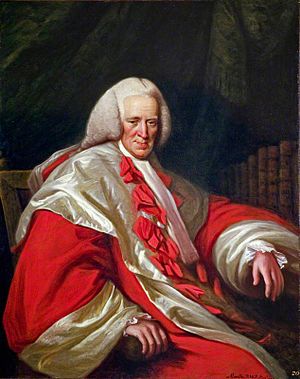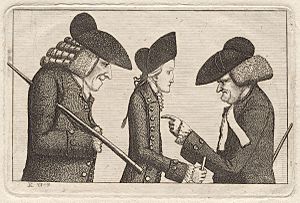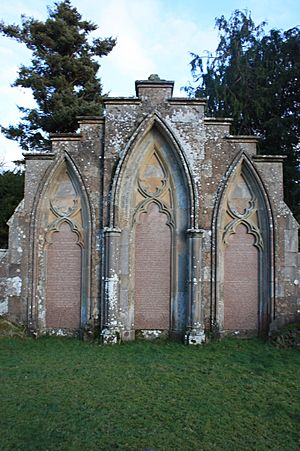Henry Home, Lord Kames facts for kids

Henry Home, Lord Kames (1695–1782) was an important Scottish writer, thinker, and judge. He played a big part in Scotland's farming revolution. He was a key person in the Scottish Enlightenment, a time when new ideas about science, philosophy, and society became popular. Lord Kames helped start the Philosophical Society of Edinburgh and was active in another group called The Select Society. He also supported many famous thinkers of his time, like the philosopher David Hume and the economist Adam Smith.
Contents
Early Life and Career
Henry Home was born in 1695 at Kames House in Scotland. He was taught at home by a private tutor until he was 16. In 1712, Home began training to become a lawyer in Edinburgh. He became a full lawyer in 1724.
He quickly became known for his writings on Scottish law. In 1752, he became a judge, which gave him the title Lord Kames.
Lord Kames was also interested in making linen in Scotland. He was one of the first owners of the British Linen Company. He served as a director for this company from 1754 to 1756.
He was also one of the judges in an important case called Knight v. Wedderburn. This case decided that slavery was against the law in Scotland.
Lord Kames passed away at the age of 87 in 1782. He is buried in the Home-Drummond family plot in Kincardine-in-Menteith.
Important Ideas and Writings
Lord Kames wrote a lot about how important property is to society. In his book Essay Upon Several Subjects Concerning British Antiquities, he explained that Scotland's politics were based on land given by the king. This was part of a system called feudalism.
Stages of Human Society
In another book, Historical Law Tracts, Lord Kames described a four-stage model of how human societies develop. This idea helped shape how people thought about history for a long time.
- Stage 1: Hunter-Gatherers
* In this first stage, families lived by hunting and gathering food. * They often avoided other families because they competed for the same food. * There were few laws, usually just rules from the family leader.
- Stage 2: Herders
* Next came herders, who raised animals like sheep or cows. * This encouraged people to form larger groups. * Still, Lord Kames didn't see this as a "true society" yet.
- Stage 3: Farmers
* The third stage was agriculture, or farming. * New jobs appeared, like plowmen, carpenters, and blacksmiths. * These jobs helped everyone in the group. * This stage brought more complex relationships and rights, needing more laws and people to enforce them.
- Stage 4: Commercial Society
* The final stage developed with market towns and seaports. * This "commercial society" brought even more laws and complexity. * But it also offered more benefits to people.
Lord Kames saw these stages happening in Scotland itself. He saw the Highlands as pastoral (herding), the Lowlands as agricultural (farming), and cities like Glasgow and Edinburgh as polite commercial centers.
Views on Human Origins
In his 1774 book, Sketches of the History of Man, Lord Kames wrote about human differences. He believed that different groups of people were created separately by God in different parts of the world. He thought that environment or climate alone could not explain these differences. His ideas were part of early studies that led to the fields of anthropology (the study of human societies and cultures) and sociology (the study of how societies work).
Literary Criticism
In his popular book Elements of Criticism (1762), Lord Kames looked at how literature was written. He argued that the best rules for writing come from understanding human nature and feelings. He believed that true rules for judging art "are all of them derived from the human heart." Professor Neil Rhodes has said that Lord Kames was very important in making English a subject taught at Scottish universities.
Family Life
Henry Home was married to Agatha Drummond. They had children, including George Drummond-Home.
Major Works
- Remarkable Decisions of the Court of Session 1706 to 1728 (1728)
- Essays upon Several Subjects in Law (1732)
- Decisions of the Court of Session from its First Institution to the Year 1740 (1740)
- Essay Upon Several Subjects Concerning British Antiquities (1747)
- Essays on the Principles of Morality and Natural Religion (1751)
- The Statute Law of Scotland (1757)
- Historical Law-Tracts (1758)
- The Principles of Equity (1760)
- Introduction to the Art of Thinking (1761)
- Elements of Criticism (1762)
- Remarkable Decisions of the Court of Session from 1730 to 1752 (1766)
- Gentleman Farmer (1772)
- Sketches of the History of Man (1773)
- Elucidations Respecting the Common and Statute Law of Scotland (1777)
- Loose Hints upon Education (1781)
See also
- George Anderson (minister)
 | Jewel Prestage |
 | Ella Baker |
 | Fannie Lou Hamer |



